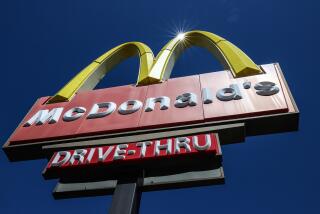Fast-food worker strikes coming to Los Angeles; higher wages sought
The fight for higher fast-food wages is coming to Los Angeles.
Just a few days before Labor Day, restaurant workers plan to walk off the job at big-name chains around Southern California to demand $15-an-hour pay, according to organizers.
The protests, part of a nationwide day of strikes called for Aug. 29, would be the latest in a series of one-day, rolling walkouts that have occurred in major cities in recent weeks. Workers have picketed McDonald’s, KFC and Taco Bell and other restaurants during peak mealtimes to demand better pay and the right to organize.
Bankrolled by the Service Employees International Union in concert with community groups, the protests are focusing attention on a group of low-income workers whose numbers are growing fast. They are also part of a drive to pressure Congress to raise the federal minimum wage of $7.25, which has not increased in four years. President Obama has supported an effort to raise the minimum wage to $9.
Quiz: How well do you know fast food?
“You can stimulate the economy by lifting up one of the largest employment sectors in the country,” SEIU spokesman Ray Pok said. “This would raise their standard of living.”
Pok said he expected hundreds of pickets to show up on Aug. 29 in Los Angeles to protest at McDonald’s locations. Wendy’s and Taco Bell are also potential targets, he said.
The effort has played well on social media at a time when U.S. income inequality is growing. Many low-wage service workers earn so little that they qualify for food stamps and taxpayer-financed healthcare.
But fast-food chains are firing back.
Scott DeFife, spokesman for the National Restaurant Assn., said that most fast-food workers earned more than the minimum wage and that many of the jobs were held by students and part-timers. He said the protests were a publicity stunt by SEIU, which had yet to organize any of the major chains.
“There’s ample evidence that this is not an organic thing but … a bit of orchestrated theater,” DeFife said. “Union representation is down at a historical low in this country, so it’s not surprising that they’re making another attempt to press for membership.”
But for Bartolome Perez, 42, the main priority is covering his family’s bills. The Los Angeles resident and McDonald’s worker plans to join the protests.
Perez, a native of El Salvador, has worked at a Mid-City outpost of the burger chain for more than two decades, serving as a janitor and a cook. His last raise — a 50-cent bump to $10.75 an hour — came five years ago.
Perez lives with his daughter and wife, who work part time. Together, they struggle to afford their $1,000 monthly rent, $220 car payment, $200 food costs and other expenses.
“We live by miracles,” he said through an interpreter. “We have to watch every cent.”
It’s a story that’s familiar in the fast-food industry, which employs about 3.7 million workers.
In protests that began in New York City in November, an effort compared to Occupy Wall Street, workers are calling for better pay. They’ve been backed by several advocacy groups and worker coalitions, including Fast Food Forward and Fight for 15. Actions have sprung up in Detroit, St. Louis, Kansas City, Mo., and other cities in recent weeks.
In Southern California, the Central American Resource Center and several women’s and clergy groups are helping to organize the local effort. With its immigrant-heavy population and scattered geography, the L.A. area had been a tough one to rally until protests in the Eastern U.S. started gaining momentum, said Lewis Logan II, an organizer and pastor of the Ruach Christian Community Fellowship of Los Angeles.
“The elements were always there for action,” Logan said. “There just wasn’t the spark.”
McDonald’s said in a statement that the protests didn’t provide “an accurate picture of what it means to work” at the chain.
“McDonald’s aims to offer competitive pay and benefits to our employees,” the company said. “We provide training and professional development for all of those who wish to take advantage of those opportunities.”
But a July study from the National Employment Law Project found that few fast-food workers advance to management ranks. Frontline positions, which pay a median hourly wage of $8.94, make up 89% of all industry jobs. Supervisors, who earn $13.06 an hour, account for 8.7%. Managers fill the tiny remaining percentage.
Food service workers and bar employees hold six of the 10 lowest-paid jobs tracked by the government, splitting the list with salon shampooers and amusement park attendants.
More than 300,000 people have signed a Change.org petition urging fast-food companies to stop paying workers with fee-loaded debit cards. The charges — for cash withdrawals, balance inquiries and even inactivity — often push earnings below minimum wage, activists said.
And with Obama’s healthcare reforms looming, many workers said their restaurants were starting to hire more part-time workers while shaving off hours from existing employees.
But some critics say the protests may do more damage than good — if they amount to anything at all.
Fast-food workers have long struggled to form unions, according to Ed Wertheim, an associate business professor at Northeastern University. Employees cycle in and out of the industry at “tremendously high” rates — greater than 75% turnover each year, he said.
“The mind-set among the vast majority of these workers is that they’re not going to be in it for the long haul as a career,” he said. “And they’re certainly viewed as being easily replaceable.”
If activists manage to substantially raise the minimum wage, workers’ jobs could be at stake, according to the right-leaning Employment Policies Institute. Eateries forced to pay higher salaries could start swapping human labor for cheaper automated technology, the group said.
And costs could rise along the fast-food supply chain as workers in the fuel, cleaning and agriculture industries also benefited from a federal minimum wage hike, DeFife said. Two-thirds of a typical restaurant’s expenses come from labor and food costs.
“A $15-an-hour minimum wage is just not a realistic scenario in this industry, or virtually any industry,” DeFife said.
El Pollo Loco cashier Jose Puac Peneleu said he’d be happy with $11.50 an hour.
The 23-year-old lives in Arleta with his sister, her infant and their mother and commutes five days a week to a Sherman Oaks strip mall.
Peneleu, a Guatemalan immigrant, was hired five years ago when he was a recent high school graduate and living in the country without legal status. Since then, his hourly wage has increased only $1.65, to $10.15.
Each month, Peneleu’s pay goes to his $110 phone bill and $75 car insurance payment. He and his sister, a manager at another El Pollo Loco, split his family’s $120 grocery list and $800-a-month rent.
He keeps trying to open a savings account, he said, but has nothing to put in it.
Now, he spends all of his free time looking for another job. He received residency papers in February. His goal: a position at a casual or fine dining establishment, where employees can earn tips.
“Of course I deserve more money,” he said. “Minimum wage is not going to help me go anywhere.”
Twitter: @tiffhsulatimes







